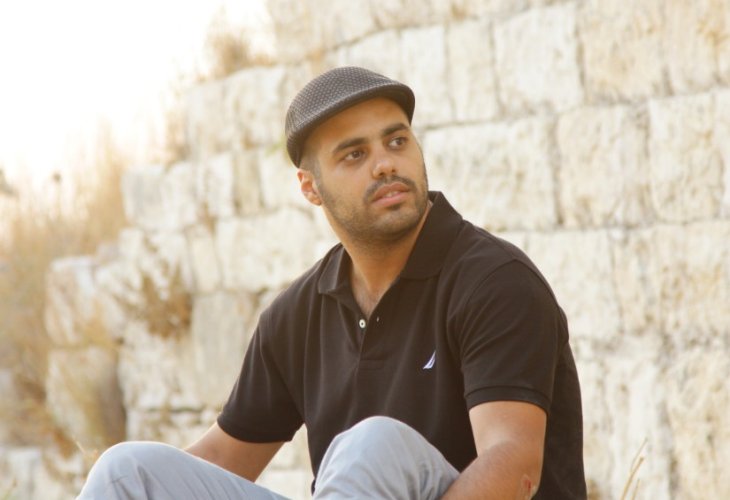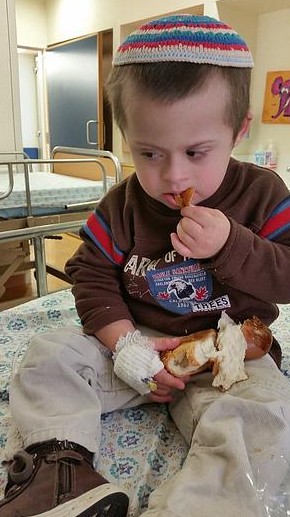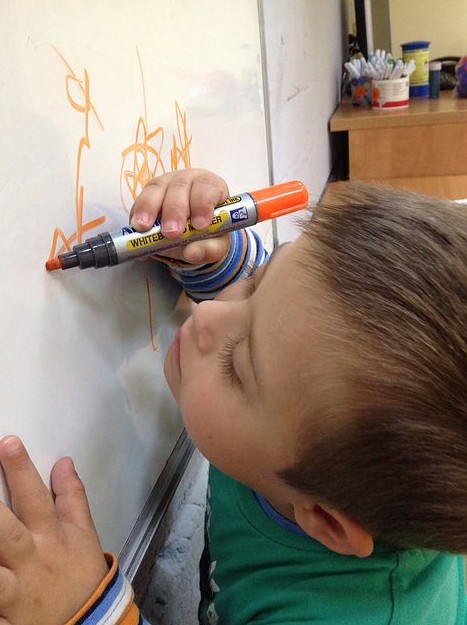"My wife looked at the baby and said: 'So what if he has Down syndrome? He's my son!'"
Nechunya, twin brother to Moria, was born with Down syndrome, but this fact did not affect his parents' happiness at all – Shlomo and Shiraz Ben Dor. In an inspiring conversation, Shlomo shares about life with their special son and the leukemia that later attacked young Nechunya. A story of faith and the strength to see the good even when everything around seems dark.

The department manager sighed lightly and finally said: "It might be that the son you gave birth to has Down syndrome. We're still not sure, but there are certain signs that suggest a possibility." The words were spoken slowly and with emphasized caution.
"I know," I answered with a smile on my face, "I saw immediately when he was born that we have a special baby with Down syndrome."
"Again - we're not sure, and we need to do some tests. It takes a while, but according to the signs..."
"I understand," I interrupted his explanation. "We have a child with Down syndrome, and that's perfectly fine, we're happy with it."
"So what? He's our son!"
Shlomo Ben Dor (50) sits before us as he reads these lines from the book he wrote about his son Nechunya, who is now five years old.
"Nechunya, our special child, came to us after years of waiting," he shares. "My wife Shiraz and I made every effort to have children naturally and then went through a complicated series of treatments. After years of waiting, disappointments, and hopes, we learned that we have twins – a boy and a girl."
However, he says, during the examinations, they were told that it was possible one of the twins could have Down syndrome. "I remember this examination as if it were today," Shlomo says, "We came in the 22nd week of pregnancy for a systems review, eagerly anticipating the images of our little embryos on the screen. The examining specialist doctor suddenly stopped the examination and solemnly announced: 'The boy has an echogenic spot in the left ventricle of the heart,' then added: 'An echogenic heart spot means statistically, there is a chance for Down syndrome. I'm referring you to a genetic counselor, who will explain the options, and, of course,' he added, 'according to the data, you can decide if you want to reduce the problematic fetus.'"
 Nechunya Ben Dor
Nechunya Ben DorAnd how did you feel about that?
"We were shocked," Shlomo replies, "not because of the diagnosis, but because of the idea of reduction. I remember how I burst out at the doctor: 'What do you mean reduce?! Take the life of one of the embryos just because it might have Down syndrome?' My wife, in contrast, was calm and composed, she calmly told the doctor: 'We did not come to hear such things. We believe in Hashem and whatever He gives us, we will accept with joy and love, the concept of 'reducing' doesn't exist for us.'"
For those who might think the way the couple received the news stemmed from denial or hope that the syndrome would be ruled out, Shlomo notes they were fully aware that their son might have Down syndrome, but they only received full confirmation at birth.
"At birth, the moment the doctor raised the baby and ensured his face was hidden from us, I realized the forecast might indeed come true. Later, when he took the baby to the weighing table, I saw my son's face. He was still covered in the white layer after birth, but it was possible to recognize his unique facial features. It was his closed eyes that seemed more prominent than usual, his small nose, and his tiny fingers that told me at that moment who the child entering our world was the unique growth we must cope with from now on."
But as Shlomo emphasizes, his wife Shiraz still did not know, but rather blessed with the benevolent blessing of the good and true. Later, Shlomo was invited to the department manager, who officially informed him that little Nechunya probably has Down syndrome. "I received the news with understanding and calmness," he recalls, "I truly didn’t think it would affect my love for my son or his acceptance. I never imagined there were cases where parents abandoned their child once they learned the news, or parents who emotionally broke down after receiving such news.
"Of course, I was subsequently required to inform my wife, who was in the maternity ward. I pushed the two tiny cribs and presented the children to her. Her expression of happiness knew no bounds. I let her experience for a few minutes the joy of motherhood she had awaited for so many years, then sat next to her and simply said: 'Shiraz, we have a child with Down syndrome.' I noticed her joyful expression didn’t change. She just asked: 'What? What do you mean? He doesn’t look like that at all.' She looked at him with loving mother's eyes and asked again: 'Really?' And then she added the sentence etched in my memory forever: 'So what?!... He's my son!' That sentence contained everything: absolute and uncompromising devotion within which she directs herself."
However, at that stage, the couple did not know that the diagnosis of the syndrome was just the beginning of the challenges awaiting their sweet baby. Challenges they would face together.
A New Challenge: West Syndrome
At seven months old, Nechunya was hospitalized for the first time when it was discovered that, in addition to Down syndrome, he also suffered from West syndrome – a severe disease impacting brain functions with a very low likelihood of full recovery. "Once again, we decided to focus only on the good," Shlomo recounts, "and we accompanied the struggle with the disease with immense joy and love, wrapping our son in them. Miraculously, and against all odds, within a year, he fully recovered."
Yet, they only enjoyed a few months of respite before being called again to a front-line battle for Nechunya's life. This time it was leukemia discovered in his small body. "Leukemia lasted eight months, during which Nechunya was hospitalized most of the time," Shlomo recalls, his face showing signs of suffering. It's hard for him to remember those days when Nechunya underwent exhausting chemotherapy treatments. "I often wished to exchange places with him, that I would bear his suffering, and he would become healthy," he recalls with tears.
Despite everything, the parents, too, tried to remain optimistic here, to see the good and believe that tomorrow would be better. "We never gave up," Shlomo emphasizes. "We always just tried to strengthen and progress."

Were there no moments of difficulty? Of breaking down?
"The truth is, I remember only one such moment. It was one day when it became clear that Nechunya had to undergo urgent emergency surgery. I was alone with Nechunya and there was no time to wait for anyone else to join us. I remember how I placed my beloved son on the operating table, completely helpless. His crying still echoed in my ears as I was led out, and he remained behind the closed doors. As mentioned, there was no living soul in the waiting room, and as if to heighten the anxiety, I suddenly noticed an old, horrifyingly displayed, surgical instrument cabinet placed there, so insensitively, in the waiting room of patients' families."
And what do you do in such moments?
"I confess – I had a moment of despair where I suddenly thought of the worst and that perhaps I wouldn't see my son again, but very quickly, I found my salvation with my Father in Heaven. I remember how I started crying, not being ashamed of anyone, just yelling: 'Father in Heaven, from whom everything comes, and nothing occurs below without Your permission from above, please guard our son! It is clear to me Nechunya came to us for a special mission, I do not know for how long you have entrusted him to our hands, but we need him here with us a little longer... Please, Master of the World, in your great mercy, do not take him from us!' On that occasion, I also appealed to Rabbi Nechunya Ben Hakana, whom our Nechunya was named after. I asked him to plead for mercy on our son's behalf to get better. The surgery lasted many hours, and at its conclusion, the doctor came out of the operating room and announced that everything went smoothly."
A Twin's Tear
Throughout the months of illness, Shlomo and Shiraz needed to also care for Moria, Nechunya's twin sister. "It was important for us to raise her like any regular child, but on the other hand, we wanted her to feel part of what was happening. She visited her brother in the hospital and sat with him on his tall bed. Every new toy Nechunya received from various organizations was hers too. Alongside it, we tried very hard to make her feel that she was no less important than he. Indeed, the cost required for this was both of us's family effort, with a division of responsibilities and splitting between us: one with Nechunya, the other with Moria, but we felt it was important for all of us."
Did she understand what her brother was going through?
"And how," Shlomo replies, "although during breaks at home she treated him like any regular brother and could even push him and knock him over on purpose, during hospitalizations, she would come to visit him and we could see how her compassion was stirring. I remember one hospitalization where Nechunya lay crying because the doctor approached him and he was afraid of her. His cry was strong, apparently stirring his twin's compassion. Suddenly, I saw Moria appear from nowhere, climb onto the bed, and lay down beside Nechunya. She brought her head close to his and whispered: 'Don't cry Nuni, don't cry Nuni...' I started tearing up. That image is deeply engraved in my heart."
Nechunya of the People of Israel
Since Nechunya's illness several years have passed, and today Nechunya is a healthy and charming five-year-old child. "Of course, there are still some tests and follow-ups at the hospital," Shlomo says, "but day-to-day Nechunya attends a regular kindergarten, integrated with regular children. He is progressing at a very fast pace, faster than expected, and overall he brings us much satisfaction."
Shlomo also shares that recently Nechunya managed to surprise them when he started recognizing letters. "As a result, we started working with him on a certain reading method based on memory. He has an excellent grasping ability and already knows how to read some words."
"But what truly matters," he adds, "is not the knowledge, but Nechunya's amazing behavior. He is very alert to the behaviors of the children in the kindergarten with him, and if, for example, a child cries, he is the first to approach and stroke them, and if someone sneezes or coughs, you will immediately hear Nechunya saying: '*l'chaim*'".
Shlomo says the book 'For This Boy I Prayed,' which tells Nechunya's life story, was written because he saw it as a mission to strengthen people in similar situations. "Throughout the journey, we shared our situation with friends, acquaintances, and our family. We did not hide anything, and we observed how Nechunya's challenges managed to bring great strength to the world. This is also the reason why I conduct lectures where I share our family story, hoping to help and benefit more people. What is truly important to me is conveying the message that everything we experience in our lives is intended to advance us, uncovering abilities that we wouldn’t find if we hadn't experienced it. Nechunya is the most wonderful gift I received in my life," he concludes with emotion, "a gift that proved to me that even in the most challenging situations, you can see the light because the light always exists."

